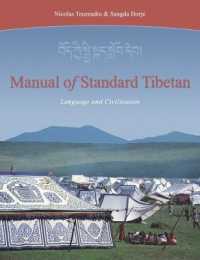Full Description
Opening Third Spaces for Research in Education challenges dominant educational research methods. It rejects the reductive binaries normalized in social science research—theory/practice, objective/subjective, quantitative/qualitative. Drawing from multiple fields and eras, the book opens third spaces between these artificial poles to help researchers expand interpretations and possibilities for research. Critiquing the current focus on the measurement of "student learning outcomes" and high-stakes assessment, the book offers conceptual tools and case examples to support educators in reconceptualizing research. The book critiques the modernist notion that learning is an individual mental process of acquiring knowledge or skills. It argues instead that learning is inextricably entangled with social relations and cannot be isolated or controlled no matter how scientifically rigorous researchers try to be in their study designs. This challenges the current goal of educational research instruction to design "valid and reliable" studies that provide evidence for "best practices," and reimagines it as opening third spaces to expand opportunities and approaches for inquiry.
Contents
Dedication
Introduction
ONE Examining Scientism in Educational Research
1.1 Technocratic research and the commodification of knowledge
1.2 The dominance of positivism and behaviorism
1.3 Scientific paradigm shifts as social consensus
1.4 Phenomenology of the social world
TWO Challenging Binary Logic
2.1 Postmodern perspectives
2.2 Histories of dialectical thinking
2.3 Pragmatism
2.4 Agential realism
THREE Critiquing Standard Research Methods
3.1 The false binary of quantitative/qualitative research
3.2 Rethinking "researchable" questions and variables
3.3 Instrumentation and problems with validity and reliability
3.4 Institutional review boards and the cursory administrative determination of ethical practices
3.5 Research reporting conventions and constraints on research possibilities
FOUR Reconceptualizing Learning in Educational Research
4.1 Problems with specifying learning outcomes and the myth of transfer
4.2 Learning as legitimate peripheral participation
4.3 Learning as identity formation
4.4 Learning as episodic, discontinuous, and nonlinear
FIVE Expanding Third Spaces for Research
5.1 Cycles of inquiry, lesson study, and archaeologies of knowledge
5.2 Multivocal narratives as third spaces
5.3 Crossing contexts and moving into borderlands
5.4 Supporting democracy and imagination in research forums
5.5 Research as an entangled material-discursive practice
Conclusions
Author Biographies
Index


![Discurso [I-II] Sobre Las Tragedias Españolas](../images/goods/ar/work/imgdatag/13132/1313208450.JPG)





